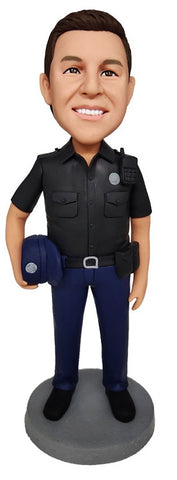meaning of police
on January 23, 2022
What is the meaning of the police in today's society?
|
 |
police |
The police is an armed national administrative force that maintains social order and defends national security.
 |
The police is an agency of state-authorized personnel whose purpose is to enforce the law, ensure the safety, health and property of citizens, and prevent crime and civil unrest. Their legal powers include arrest and the state's use of force legalized by a violent monopoly. The term is most often associated with the police force of a sovereign state that is empowered to exercise police powers within that state within a defined legal or territorial responsibility. |
|
|
The police force is generally defined as being independent of the military and other organizations involved in defending the country from foreign aggressors. The police force is usually a public sector service, funded through taxation.
A police force may also be called a police department, police department, police, gendarmerie, crime prevention, protective service, law enforcement agency, civil guard, or citizen guard. Members may be referred to as police officers, soldiers, sheriffs, police officers, rangers, sheriffs or citizen/civilian guards. |
 |
10 Types of Police Officers
1. Uniformed officers
When it comes to general law enforcement duties such as maintaining regular patrols and responding to emergency calls, uniformed police officers are likely to be motorists. Whether working in large cities or small towns, these officers are also involved in investigating crime, directing traffic and helping citizens in need.
2. Detectives
Detectives are active at crime scenes and spend their time investigating the scene to piece together what happened. Detectives will work with witnesses and suspects, interviewing them and gathering leads and evidence. As the primary investigative fact-finders in many court cases, they are responsible for writing detailed official reports detailing all the information they have collected.
3. State police and highway patrol officers
You may have seen State Police or Highway Patrol vehicles in different colors, but do you know what exactly they are doing? State Police are often busy patrolling highways, but they also play a vital role in assisting local police agencies when emergencies or investigations exceed their resources and jurisdiction. These state law enforcement officials are often relied upon to assist with law enforcement duties in small towns and rural areas.
4. Fish and game wardens
Sometimes overlooked in the field of law enforcement, fish and game keepers are law enforcement professionals tasked with enforcing rules and regulations designed to protect wildlife. This type of officer typically works for a state protection department or federal agency. Fish and game keepers play a major role in enforcing fishing and hunting regulations. Not only do they patrol hunting and fishing areas, but they also conduct search and rescue operations and investigate complaints and accidents. Given the areas covered by this professional role, fish and game keepers often operate boats and off-road vehicles.
5. Transit and railroad officers
When it comes to law enforcement, transportation and railroad officials may not be the primary consideration for most people. So what exactly do they do? These officers patrol public transit areas such as subways, commuter trains and freight train stations. Officers in these roles are tasked with patrolling rail yards or other transportation hubs to prevent vandalism, trespassing, theft, smuggling or other crimes commonly found on our transportation network.
6. Sheriffs
Although they perform similar duties to police chiefs, most chiefs have at least one notable difference—they are usually elected to the position by community members. Sheriffs and deputy sheriffs enforce the law similarly to local uniformed police, except that their jurisdiction is at the county level and covers areas outside of the local police department.
7. Special jurisdiction police
Certain police agencies are dedicated to special geographic jurisdictions and law enforcement responsibilities. Have you ever wondered who oversees places like college campuses or schools? Transportation systems such as public college and university police forces, public schools, and airports are all examples of jurisdictions where special jurisdiction police work as uniformed police officers. Special jurisdiction police are usually full-service units that provide the same services as local police.
8. Air marshals
The Federal Air Force has a unique role in law enforcement. They are designed to deter and protect the public and crew from hostile passengers and terrorist acts on any form of aviation, including commercial flights. This usually means conducting survey work on land and in the air. They are also deployed on flights to actively protect the public and crew.
9. Border patrol agents
While you might imagine Border Patrol agents stalking rural areas or performing routine customs checks at borders or airports, they can also work in many other ways. While many of them are responsible for investigating smuggling and other illegal activities at land and coastal borders and communicating with border crossings, Border Patrol agents can also find specialized jobs within Customs and Border Patrol agencies and have the opportunity to engage in horse patrol, bicycle Patrol and emergency medical services.
10. Crime scene investigator
Crime scene investigators, sometimes called forensic technicians or forensic scientists, are law enforcement professionals who search for evidence at crime scenes, collecting and documenting their findings. Depending on the role, they may conduct laboratory analysis of the evidence they collect. Additionally, they may be required to testify as expert witnesses in criminal trials - which may require explaining complex topics in plain language, so strong communication skills are a big plus.
Is your future a police job?You have chosen a life of stability and order that requires an innate patience for challenges. This patience and sense of responsibility come together to create an atmosphere called peace, which is dedicated to the masses. |
|













